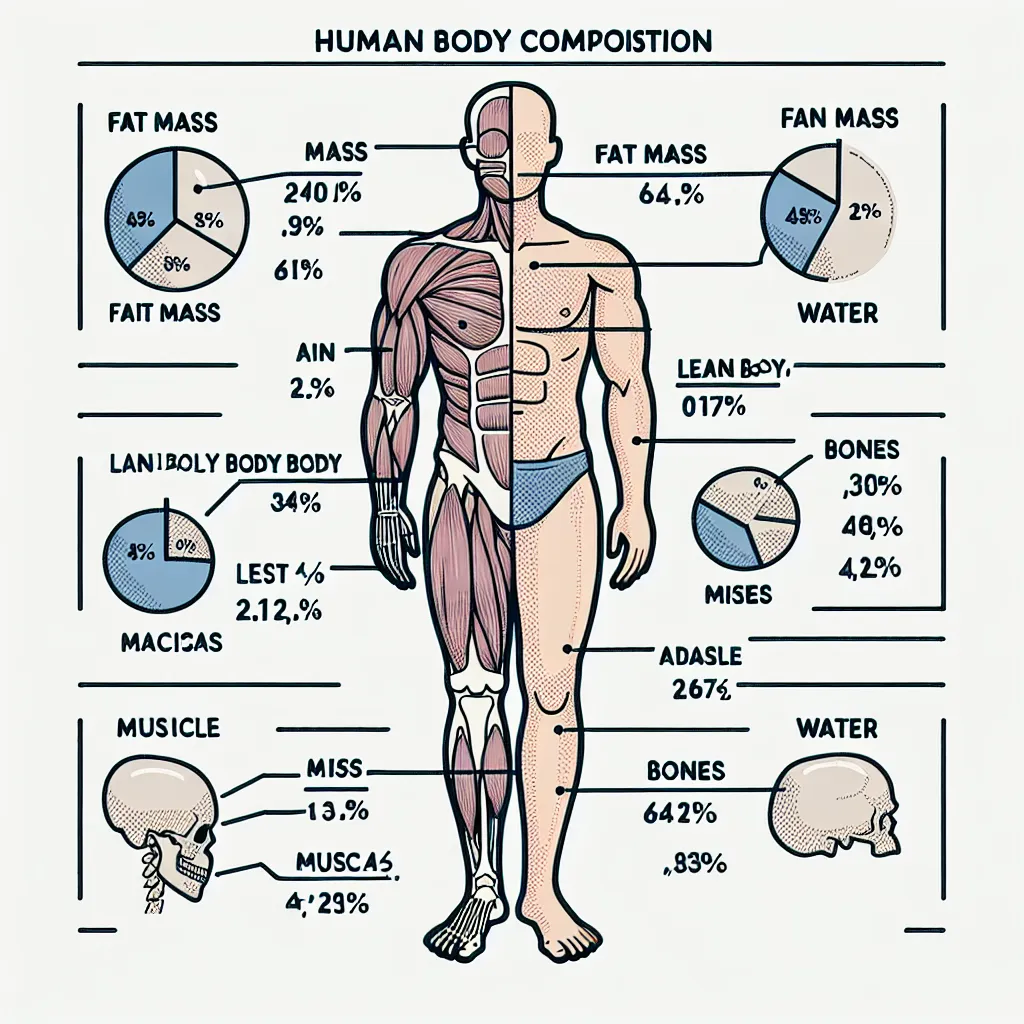Body composition (noun) /ˈbɒdi ˌkɒmpəˈzɪʃən/: The proportion of fat, muscle, water, and bone in the human body.
In the world of health and fitness, understanding body composition is crucial. This term frequently appears in IELTS exams, particularly in the Reading and Writing sections. Let’s dive deep into mastering this essential vocabulary for your IELTS success.
1. Context and Usage of ‘Body Composition’
Examples in Context
-
Doctors often use body composition analysis to assess a patient’s overall health.
In this sentence, “body composition” is used in a medical context, highlighting its importance in healthcare. -
Athletes focus on improving their body composition to enhance performance.
Here, we see the term applied in sports, emphasizing its relevance to athletic performance. -
The nutritionist explained how diet affects body composition over time.
This example shows how “body composition” is linked to nutrition, a common topic in IELTS. -
Regular exercise can significantly alter one’s body composition, reducing fat and increasing muscle mass.
This sentence demonstrates the relationship between physical activity and body composition. -
In aging populations, maintaining a healthy body composition becomes increasingly challenging.
This usage highlights the relevance of body composition across different age groups, a potential topic in IELTS Writing Task 2.
Common Contexts
“Body composition” frequently appears in health, nutrition, sports science, and medical contexts. In IELTS, you might encounter this term in passages about fitness trends, obesity research, or nutritional studies.
Frequency in IELTS
This term has a moderate to high frequency in IELTS exams. It’s most likely to appear in:
- Reading passages on health and fitness
- Writing Task 2 essays on topics related to public health or lifestyle
- Speaking Part 3 discussions about health trends or personal fitness

2. Vocabulary Analysis
Word Structure
- Body (noun): The physical structure of a person or animal
- Composition (noun): The nature of something’s ingredients or constituents; the way in which a whole or mixture is made up
Synonyms and Antonyms
Synonyms:
- Body makeup
- Physical constitution
- Bodily structure
While there aren’t direct antonyms, related contrasting terms include:
- Body shape (focuses more on external appearance)
- Body weight (considers only mass, not composition)
3. Memorization Techniques
Mind Mapping
Create a mind map with “Body Composition” at the center, branching out to related concepts:
- Components: Fat, Muscle, Water, Bone
- Measurement methods: DEXA scan, Bioelectrical impedance
- Related terms: BMI, Body fat percentage, Lean mass
- Influencing factors: Diet, Exercise, Age, Genetics
Storytelling Technique
Imagine a character named “Composition” who’s in charge of a body-building factory. He oversees four departments: Fat, Muscle, Water, and Bone. His job is to maintain the perfect balance between these elements to create a healthy “body composition.”
4. Practice Exercises
Application Exercise
Write a paragraph about the importance of maintaining a healthy body composition. Use at least three of the following terms: body composition, fat percentage, lean mass, muscle tissue, metabolic rate.
IELTS-style Question
Writing Task 2: Some people believe that governments should take measures to improve the average body composition of their citizens. To what extent do you agree or disagree?
In your response, consider:
- The role of government in public health
- Personal responsibility vs. state intervention
- Potential measures to improve body composition
- Long-term benefits and drawbacks of such policies
5. Conclusion
Understanding and effectively using the term “body composition” can significantly enhance your performance in the IELTS exam, particularly in health and fitness-related topics. Remember to practice using this term in various contexts and connect it with related vocabulary to build a comprehensive understanding.
We encourage you to create your own sentences using “body composition” and share them in the comments below. How would you use this term in a discussion about public health or personal fitness? Your practice will not only reinforce your learning but also help fellow IELTS aspirants!
For more insights on related topics, check out our articles on metabolic rate and resting metabolic rate (RMR), which are closely linked to body composition and often appear together in IELTS materials.